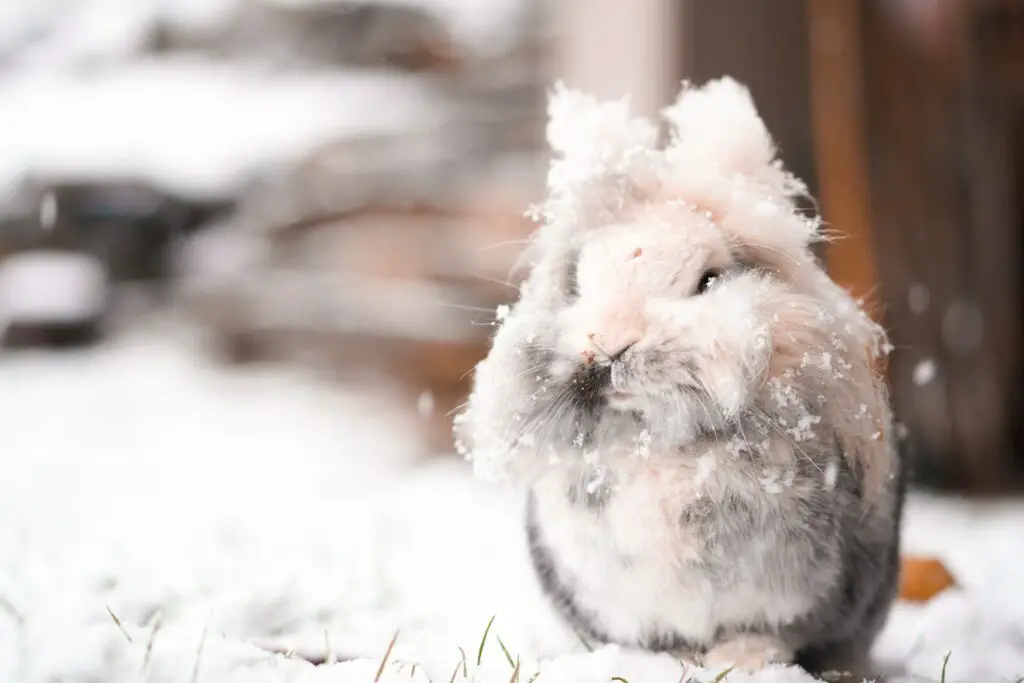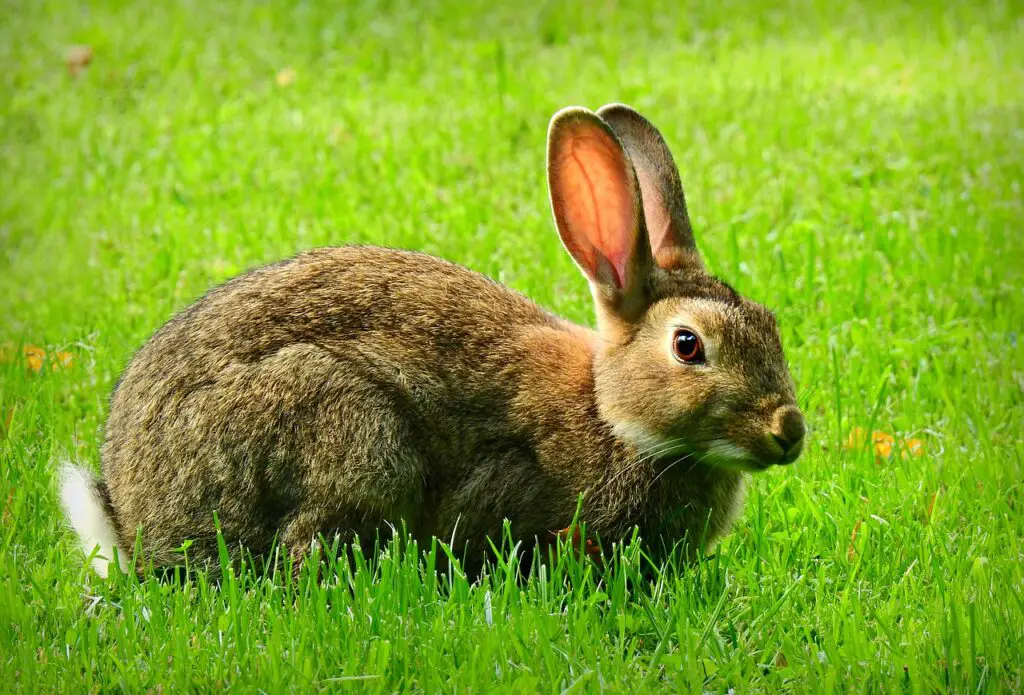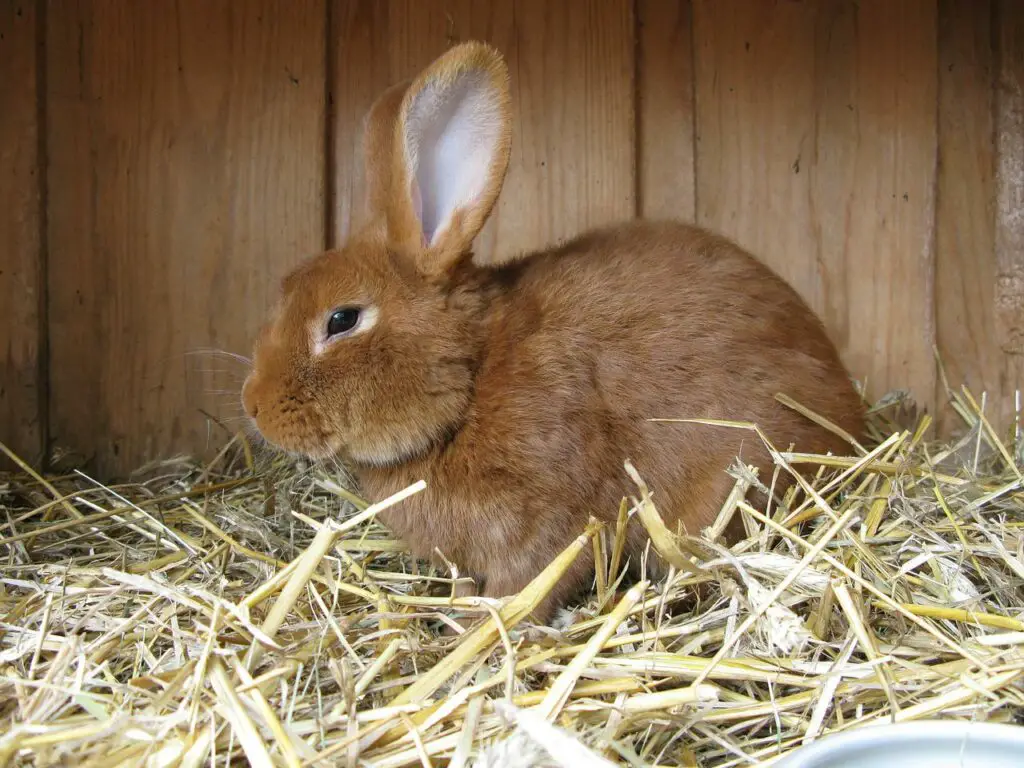Last Updated on June 12, 2023 by Laura Thompson
You’ve probably heard about rabbits being able to survive in snow. You’ve also probably heard that rabbits tolerate cold weather better than hot weather. But how do bunnies in the snow fare?
And so you might be thinking – is it okay for me to take my bunny out in the snow for some playtime? Will my bunny be safe in its background hutch all winter, despite the freezing temperatures?
This article will be all about rabbits and cold temperatures. Although our furry little friends can fare well in cold weather, extremely cold temperatures can be very dangerous to them.
So it’s important to know what to do to keep them warm and comfortable during the winter months.
Contents

Can Rabbits Survive Outside in Freezing Temperatures?
Rabbits do tolerate cold weather better than hot weather because they have fur that can insulate them in the cold.
Wild rabbits can survive in the snow because they dig burrows where temperatures stay warm even during freezing months. However, domestic rabbits don’t have such capacity to they are highly dependent on their pet owners to keep them warm.
You might be outside in the snow with your breath fogging in front of you and your teeth probably chattering. Meanwhile, your rabbit will probably be hopping around like it’s just another summer’s day.
This is because, unlike rabbits, humans do not have the fur to keep in heat and we do not have the ears to help us thermoregulate.
Another adaptation that is unique to rabbits and that helps them survive and play in the snow is the thick fur pads on the bottom of their feet.
Most breeds have this adaptation so it’s okay for them to let be let out in a snowy yard provided that they are supervised and not for long periods of time.
Rabbit ears are another natural miracle that has immensely helped rabbits to keep warm during the cold months. You see, rabbit ears have more uses other than adding to the cuteness factor of our pet rabbits.
Rabbits regulate their body temperature using their ears. Their ears are made up of a complex set of vessels that expand and contract depending on the temperature.

When rabbits are trying to conserve body heat they will close up the vessels in their ears to prevent heat from escaping. In the summer months, rabbits open these vessels so that the rabbits are able to release more heat.
Did you know that the longer the rabbit’s ears are the more it is that they can release more heat? This is the reason why tropical rabbits tend to have longer ears than rabbits who live in cold climates.
However, there is a temperature that is too cold for rabbits. You can always check if your rabbit is feeling too cold by their ears.
Normally, when the surrounding temperature is colder than usual, rabbits will conserve heat thus making their ears cold.
If their ears are colder than usual than you should their body temperature, a significant drop in body temperature can mean that your rabbit is suffering from hypothermia.
This is fatal to rabbits thus, you have to take measures to warm them or better yet, take them to the nearest vet.
How Cold is Too Cold for Rabbits?
Rabbits can tolerate temperatures down to 40 degrees Fahrenheit and are known to tolerate temperatures as low as 20 degrees Fahrenheit.
However, anything lower than 20 degrees might be too cold for rabbits and therefore, would need extra steps and precautions to keep them safe and comfortable.
It’s important that during the cold months your rabbits are properly cared for. They should be kept dry at all times. Rabbits who live in outdoor hutches should not be exposed to cold drafts and damp conditions.
Aside from the fact that rabbits hate getting wet, wet fur does not dry easily and therefore increases the risk of your rabbit contracting pneumonia or getting hypothermia both of which are fatal to them.
Older rabbits can also suffer from arthritis when left in the cold for far too long. Baby rabbits can also not survive long if they have not yet developed a full winter coat.
A rabbit hutch should have temperatures from 60 to 65 Degrees Fahrenheit. If your rabbit lives outdoors then it’s better that they be moved indoors to avoid the freezing temperatures. Otherwise, their hutches would need additional work and implements to keep them warm.
How to Care for Rabbits During Cold Months?
There are multiple ways you can do to keep your rabbit warm and most importantly, healthy when winter comes. Here are some tips for your bunnies in the snow:
1. Hutches must be temperature proof
It has always been emphasized that rabbit hutches play an important factor in the well-being of pet rabbits.
They must be four times bigger than the rabbit’s size as it will be able to allow to rabbit some free space to roam while holding its sleeping area, bathroom, and eating area.
Rabbit hutches should also be predator-proof and escape-proof. However, it is important that it should also be temperature-proof.
The hutches for outdoor rabbits should be insulated enough to keep them warm during the winter months. It should be well-ventilated enough to keep ideal temperatures during the warm season.
It is advisable that rabbit hutches have a sloped roof to keep rain and water from seeping in. Rabbit hutches should also be raised from the ground to keep them from getting damp. Curing the wood is also very important to ensure its stability.

2. Provide additional beddings
Bunny bedding includes hay. During the winter months, it is advisable that you give them more hay as beddings. These beddings will keep them warm as they would have more room to snuggle or burrow into.
Do not give them damp hay, and ensure that no water gets into the hutch that might wet the hay. Rabbits have very sensitive guts and they might eat these damp hay. Wet hay will undoubtedly upset their tummies.
3. Keep rabbit areas clean ALWAYS
Rabbit hutches should always be clean whatever the weather conditions. It is important that your rabbit’s fur stay dry.
If you don’t consistently clean your rabbit’s hutches then you increase the risk of them having wet fur that could be very dangerous to them.
Also keeping your rabbit areas clean will let you inspect your rabbit’s hutch better. You will be able to know if their beddings are damp or if water seeps in through the slats.
4. Keep them active
It’s winter, and it’s cold and you’re probably thinking that lazing around is the best thing to do and that your pet needs rest from the constant exercise. This is wrong, you should keep to your routine even during winter.
Rabbits are creatures of habit and disrupting their routine will stress them out and stressed out rabbits can develop illnesses.
You can try letting them play in the snow, but do not let them play around for a long time so as not to wet their fur too much. Make sure to dry them thoroughly as well.
If you have a bunny-proof indoor area they can play in then better. Winter months are long and keeping your rabbits cooped up all day long will leave them bored and restless.
5. Provide adequate water
Always provide quality water to your rabbits even during the winter months. Keep checking that the water in their bowls is not frozen and replace it consistently.
It’s also advisable to provide a pet bottle filled with water as well as a bowl of fresh water to keep your pets sufficiently hydrated.
6. Provide quality hay
Hay is essential to a rabbit’s diet, especially during winter. Outdoor rabbits might not be able to forage for the grass or leafy greens during the cold season.
This is why owners need to provide quality hay for rabbits to be healthy. It also promotes good fur growth that will then help rabbits to have protection in the snow.
Conclusion
Rabbits fare better in the cold than in warm weather but unlike their wild cousins. They have the advantage of knowing how to burrow, while domestic rabbits mainly rely on their owners to protect them from harsh weather.
Therefore, hutches, adequate hydration, and a good diet should be maintained all year round to ensure healthy rabbits.
Laura is an experienced wildlife rehabilitator and conservationist residing in Madison, Wisconsin. Her love for rabbits was sparked during her early career when she nursed an injured wild rabbit back to health. Today, she runs “Hoppy Haven”, a rehabilitation center dedicated to the care and release of injured wild rabbits.
